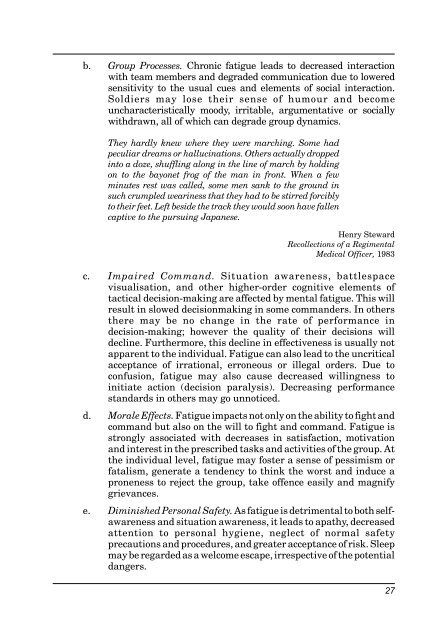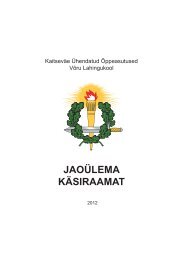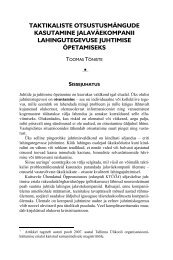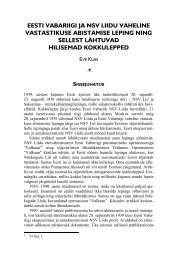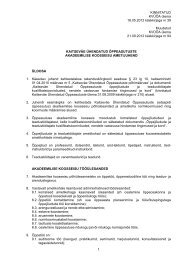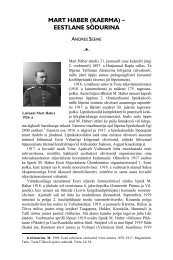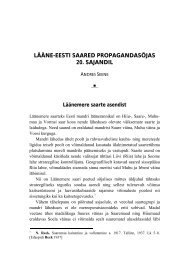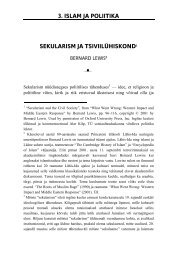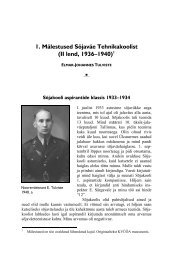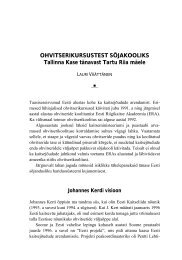Fatigue Management
Fatigue Management
Fatigue Management
Create successful ePaper yourself
Turn your PDF publications into a flip-book with our unique Google optimized e-Paper software.
. Group Processes. Chronic fatigue leads to decreased interaction<br />
with team members and degraded communication due to lowered<br />
sensitivity to the usual cues and elements of social interaction.<br />
Soldiers may lose their sense of humour and become<br />
uncharacteristically moody, irritable, argumentative or socially<br />
withdrawn, all of which can degrade group dynamics.<br />
They hardly knew where they were marching. Some had<br />
peculiar dreams or hallucinations. Others actually dropped<br />
into a doze, shuffling along in the line of march by holding<br />
on to the bayonet frog of the man in front. When a few<br />
minutes rest was called, some men sank to the ground in<br />
such crumpled weariness that they had to be stirred forcibly<br />
to their feet. Left beside the track they would soon have fallen<br />
captive to the pursuing Japanese.<br />
Henry Steward<br />
Recollections of a Regimental<br />
Medical Officer, 1983<br />
c. Impaired Command. Situation awareness, battlespace<br />
visualisation, and other higher-order cognitive elements of<br />
tactical decision-making are affected by mental fatigue. This will<br />
result in slowed decisionmaking in some commanders. In others<br />
there may be no change in the rate of performance in<br />
decision-making; however the quality of their decisions will<br />
decline. Furthermore, this decline in effectiveness is usually not<br />
apparent to the individual. <strong>Fatigue</strong> can also lead to the uncritical<br />
acceptance of irrational, erroneous or illegal orders. Due to<br />
confusion, fatigue may also cause decreased willingness to<br />
initiate action (decision paralysis). Decreasing performance<br />
standards in others may go unnoticed.<br />
d. Morale Effects. <strong>Fatigue</strong> impacts not only on the ability to fight and<br />
command but also on the will to fight and command. <strong>Fatigue</strong> is<br />
strongly associated with decreases in satisfaction, motivation<br />
and interest in the prescribed tasks and activities of the group. At<br />
the individual level, fatigue may foster a sense of pessimism or<br />
fatalism, generate a tendency to think the worst and induce a<br />
proneness to reject the group, take offence easily and magnify<br />
grievances.<br />
e. Diminished Personal Safety. As fatigue is detrimental to both selfawareness<br />
and situation awareness, it leads to apathy, decreased<br />
attention to personal hygiene, neglect of normal safety<br />
precautions and procedures, and greater acceptance of risk. Sleep<br />
may be regarded as a welcome escape, irrespective of the potential<br />
dangers.<br />
27


